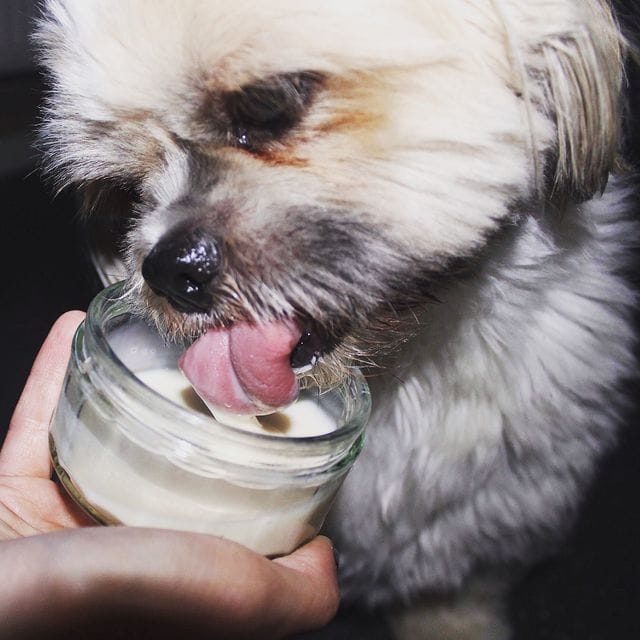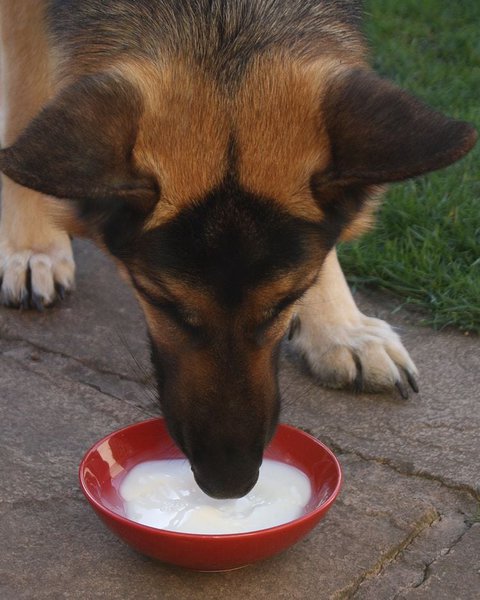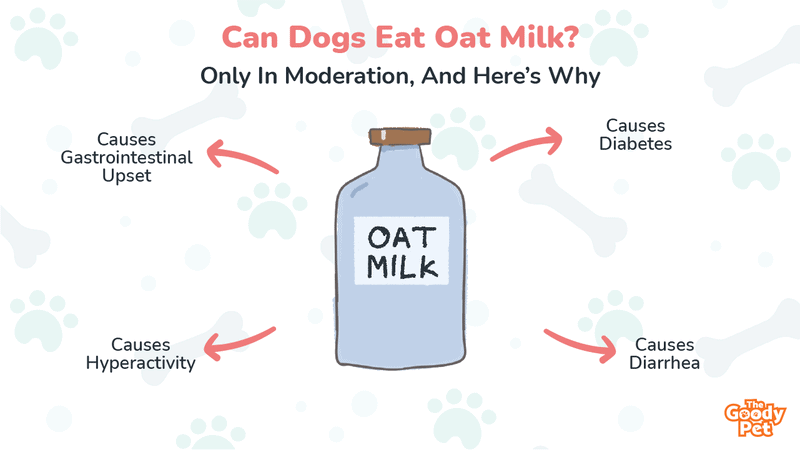These days there are so many alternatives to the traditional dairy milk products that are not made from cow’s milk. You would see plant-based milk alternatives abound on grocery shelves like almond and oat milk. These non-dairy milk products are supposedly the healthier choice because they contain fewer calories than dairy milk.
Now, if you are nuts about milk but aren’t sure if you can share some oat milk with your dog, then, you’ve come to the right place. Yes, your beloved pooch can partake with your delicious and nutritious plant-based oat milk, but only in moderation.
Oat milk is good for your dog because it has lower lactose and sugar content, making this a better milk alternative for lactose-intolerant dogs. But, avoid overindulging your dog with oat milk because of its high fiber content as this can lead to gastrointestinal health problems.
For this article, you will learn more about the nutritional goodness that oat milk can give to your baby. What if your dog had too much oat milk, how will this affect its overall health? How much is safe for your dog to consume? Let’s find the answers now…
Is Oat Milk Safe For My Dog?

Yes, for as long as you stick to the right proportion of oat milk, this non-dairy milk product is safe for your fido to drink as an occasional treat.
But, always choose unsweetened oat milk because it is mainly made from only two ingredients – water and oats. Oat milk is made by soaking the oatmeal in water, blending, and then strained to achieve a creamy texture that we all love.
Though oat milk does not contain toxic ingredients (unless you buy the sweetened one), still, you should only give it in the right amount, lest, your dog can have some gastrointestinal bouts.
Let’s now talk about the reasons why oat milk is safe for your dog if given in moderation…
Benefits Of Oat Milk For Your Dog
Actually, once the puppies are weaned from their mothers, dairy milk should no longer be a part of their diet.
This is because dairy milk is the top source of food allergies as a majority of dogs are lactose-intolerant. Diarrhea and vomiting are some of the common symptoms.
Since oat milk is a non-dairy milk product, then it is beneficial for your dog’s health if given occasionally. In fact, compared to other plant-based milk, oat milk is the best choice.
Unlike almond milk that is high in fat, oat milk is not. The same is true with soy milk which has high levels of sugar, oat milk contains less.
How Much Oat Milk Is Safe For Your Dog?
The recommended amount is about 2 tablespoons once a week, but it should never be more than ¼ cup. Itemized below are the nutritional goodness of oat milk:
- Oat milk contains fewer irritants and allergens, hence, it’s ideal for lactose intolerant dogs.
- Oat milk is basically gluten-free.
- Oat milk is high in fiber, ideal for dogs that have bowel movement issues.
- Oat milk is loaded with vitamins and minerals like calcium and iron, B-complex vitamins, vitamins A and D.
- Oat milk is rich in proteins.
- Oat milk prevents canine anemia.
- Oat milk is highly digestible because it is low in fat.
- Oat milk builds stronger bones and muscles because of its calcium content.
Now, for your fido to enjoy all the benefits of oat milk, allow us to emphasize to you that it is best if you will choose unsweetened oat milk.
Otherwise, if you constantly give sweetened oat milk, sugar can lead to tons of health problems like obesity and heart problems.
Plus, make sure that the oat milk does not contain xylitol, a sugar substitute that can cause liver and kidney problems, and hypoglycemia.
Apart from sugar and sugar substitutes, what are the other precautions you need to know before giving oat milk to your dog?
Will Oat Milk Hurt My Dog?

Yes, oat milk can hurt your dog if it drank too much of it. Always keep in mind that feasting on human food can hurt your fur baby.
The usual side-effects of having too much oat milk are gastrointestinal upset, hyperactivity, diabetes, and increased weight.
Gastrointestinal Upset
As we all know, oatmeal is fibrous human food and that goes for oat milk, too. The problem is that too much fiber in your dog’s diet can affect the digestive system in a negative way. That said, if you spoil fido with oat milk, expect it to suffer from constipation or diarrhea.
Hyperactivity
In case the oat milk that you have at home is store-bought and sweetened, don’t be surprised if your dog suddenly becomes hyperactive. As you know, it can be pretty challenging to control a dog that is in an erratic and uncontrollable state.
Not to forget that too much sugar can increase the heart rate of your dog leading to heightened anxiety.
Diabetes, weight gain, and dental problems are also some of the medical problems associated with the high sugar food consumption of dogs.
How Do I Give Oat Milk To My Dog?
When introducing human food to your dog, always do it in a gradual manner.
Give your dog a small amount of oat milk mixed in its food. Then observe how your pooch reacts to the food. If your pooch seems fine, you can give it a little bit more next time.
Another option is to place a small amount of oat milk onto its shallow bowl. Give this once a week for your dog’s additional weekly serving of fiber.
By doing it slowly, you allow your dog’s body to process the oat milk without any adverse reactions. And even if your dog got used to it, always remember that it should always be in moderation, never more than a quarter of a cup.

What About Flavored Oat Milk?
As a general rule, it is safer for your fido if you give unflavored human food like unsweetened and plain oat milk. In fact, oat milk is fairly easy to do at home.
As we said earlier, all it takes is to combine two ingredients – 4 cups of water and 1 cup of rolled oats. Blend these two ingredients for about 45 seconds and then pour them on a container through a cheesecloth or coffee filter.
The reason why we recommended homemade over commercially available oat milk is because of the added ingredients like vanilla and chocolate.
That said, if you can make oat milk at home, the better it is for your dog so it will not ingest the following ingredients that are mixed with commercially-produced oat milk:
- Iodized salt
- Calcium carbonate
- Calcium phosphate
- Canola oil
- Sugar or artificial sugar
- Emulsifiers
- Flavorings





